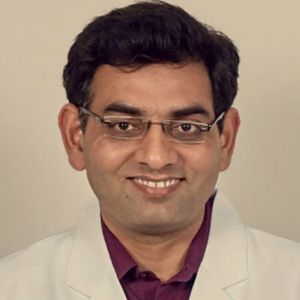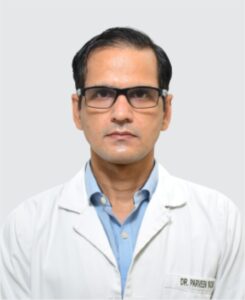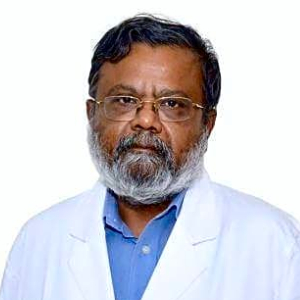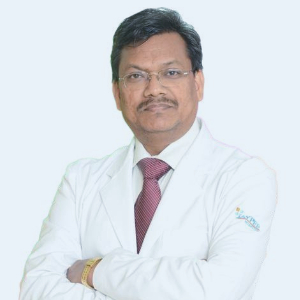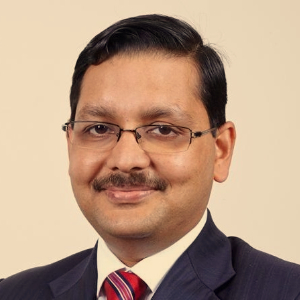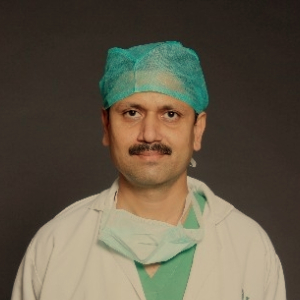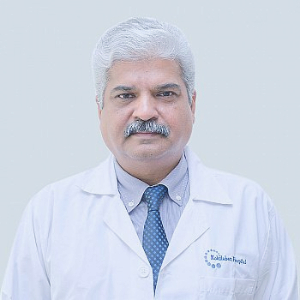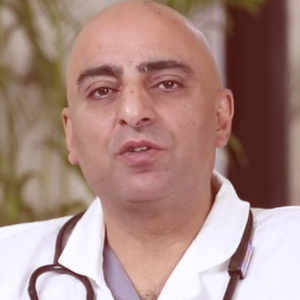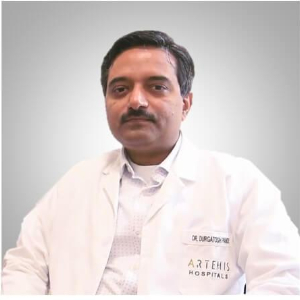Best Doctors in India for Mediastinoscopy
- Top Surgical Oncologist | BLK Hospital, New Delhi, India
- 20+ Years Experience
- BLK Super Specialty Hospital, New Delhi
Profile Highlights:
- Dr. Surender Kumar Dabas is a highly esteemed specialist in Surgical Oncology and Robotic Surgery, renowned for his vast experience and expertise. With over 20,000 complex cancer surgeries to his credit, including 2,500 robotic surgeries, he stands as a leader in his field.
- His expertise spans a wide array of specialties including Robotic Scarless Head & Neck Cancer Surgery, Robotic Esophageal & Lung Cancer Surgery, Robotic Pancreatic & Colorectal Surgery, and Robotic Prostate, Bladder & Kidney Cancer Surgery.
- Additionally, Dr. Dabas is a trailblazer in Robotic Surgical Oncology in India, pioneering the Robotic Surgical Oncology Programme and serving as an international mentor for Robotic Onco Surgeries. He has played a pivotal role in teaching and advancing robotic surgical techniques across the country, particularly excelling in Head and Neck Onco Surgeries, with the highest number performed in Asia.
- Thoracic Surgeon & Surgical Oncologist, Gurugram, India
- Over 17 Years Experience
- Artemis Hospital, Gurgaon
Profile Highlights:
- With over 17 years in oncology and 11 years specifically in thoracic surgery, Dr. Parveen Yadav stands as one of the premier thoracic surgeons in Delhi NCR.
- Dr. Yadav boasts extensive proficiency in various domains, including intervention bronchoscopy, soft tissue sarcoma, medical and airway diseases, and minimally invasive esophageal and lung surgeries.
- His repertoire includes over 3000 major thoracic procedures, notably more than 1000 surgeries for esophageal cancer and other esophageal disorders, and an equal number for lung cancer and related conditions, all yielding exemplary outcomes.
- Thoracic Onco Surgeon, New Delhi, India
- Over 30 years’ experience
- Sir Gangaram Hospital New Delhi
Profile Highlights:
- Dr. Sabyasachi Bal specializes in Thoracic Onco surgery and provides treatment for lung cancer, chest cancer, and other types of thoracic malignancies.
- He has over 30 years of experience in the field and has reformed thoracic cancer surgery in India. He has also added Robotic Thoracic Surgery to his list of specializations.
- Dr. Sabyasachi Bal’s primary focus lies in the management and treatment of cancers affecting the thoracic regions and organs near the lungs and chest of both adolescents and adults.
- Top Surgical Oncologist | Max Hospital, Saket, New Delhi, India
- 21+ Years Experience
- Max Super Specialty Hospital, Saket, New Delhi
Profile Highlights:
- Dr. Pawan Gupta is a well-known Surgical Oncologist in India having more than 2 decades and has performed over 7000 onco-surgeries for head and neck, thoracic, breast, GI, and gynecological cancers.
- Before his current role at Max Healthcare, he served as the Additional Director of Surgical Oncology at Jaypee Hospital in Noida (2013-2018).
- Surgical Oncologist, Gurugram, India
- Over 26 years’ experience
- Fortis Memorial Research Institute
Profile Highlights:
- Dr. Vedant Kabra is a reputed Surgical Oncologist with specializations in the surgical treatment of breast, head and neck, thoracic, urological, and GI cancers.
- He has more than 20 years of experience in the field and has performed more than 12,000 cancer surgeries related to breast, GI, head, and neck, and Thoracic and GI cancers.
- Dr. Vedant Kabra received his training in surgical oncology from some of the premier institutes of the world including the National Cancer Center, Singapore, and Tata Memorial Hospital, Mumbai
- He has been a part of several prestigious hospitals in India and has successfully performed several complex cancer procedures including Robotic Surgery for Cancer.
- Top Surgical Oncologist | Apollo Hospital, New Delhi, India
- 20+ Years Experience
- Indraprastha Apollo Hospital, New Delhi
Profile Highlights:
- Dr. S M Shuaib Zaidi is a Senior Consultant of Surgical Oncology at Apollo Cancer Institute of Indraprastha Apollo Hospital.
- His expertise lies in the surgical treatment of cancer of the lungs, esophagus, breast, GI tract, and mediastinal regions.
- Dr. Shuaib Zaidi has close to 2 decades of experience in the field of Surgical Oncology and his expertise lies in Thoracic Oncology surgery.
- Dr. Shuaib is known to have developed an innovative technique known as Radical Neck dissection for head and neck cancer surgery that helps in preserving the marginal mandibular nerve in order to ease the cosmetic outcome of the procedure.
- Dr. Zaidi also has experience in Robotic Surgery and received training in the procedure from IRCAD in Strass Bourg, France.
- Top Surgical Oncologist | Kokilaben Hospital, Mumbai, India
- 35+ Years Experience
- Kokilaben Dhirubhai Ambani Hospital
Profile Highlights:
- With over 35 years of experience, Dr. Rajesh Mistry is one of the best surgeons for Thoracic and Head & Neck Surgeries.
- He is an expert in performing all types of head and neck cancer surgeries including the thoracic region and has performed more than 700 thoracic onco-surgeries, 350 minimally invasive surgeries, 350 open surgeries, 200 Lobectonomies, 250 Esophagectomies, and more than 40 Robotic surgeries for Head and Neck related cancers.
- Top Surgical Oncologist | Apollo Hospital, New Delhi, India
- 26+ Years Experience
- Indraprastha Apollo Hospital, New Delhi
Profile Highlights:
- Dr. Sameer Kaul is a distinguished Surgical Oncologist with more than 26 years of experience, affiliated with Apollo Hospitals Indraprastha in New Delhi.
- His expertise extends to the management of complex cancer cases, including breast cancer, liver cancer, pancreatic cancer, and rectal cancer.
- He is also skilled in performing liver surgeries, providing invaluable care for patients battling liver cancer.
- Surgical Oncologist, Dwarka, New Delhi, India
- Over 20 years’ experience
- Manipal Hospitals, New Delhi
Profile Highlights:
- Dr. Durgatosh Pandey is a renowned Surgical Oncologist.
- He has over 20 years of experience in surgical oncology in top cancer institutes in India.
- He was the Director of Surgical Oncology at Artemis Hospital, Gurugram.
- Currently, he is the Head of Oncology Sciences & Consultant – Surgical Oncology at Manipal Hospitals, Dwarka, New Delhi.
Best Hospitals in India for Mediastinoscopy
- City: New Delhi, India
Hospital Highlights:
- Over the last 33 years, the Fortis Escorts Heart Institute has set new standards in cardiac treatment with groundbreaking research. It is now known around the world as a centre of expertise for Cardiac Bypass Surgery, Interventional Cardiology, Non-invasive Cardiology, Paediatric Cardiology, and Paediatric Cardiac Surgery.
- The hospital has cutting-edge laboratories that perform a wide range of diagnostic tests in Nuclear Medicine, Radiology, Biochemistry, Haematology, Transfusion Medicine, and Microbiology.
- Fortis Escorts Heart Institute boasts a diverse group of bright and experienced doctors who are backed up by a team of highly qualified, experienced, and devoted support professionals as well as cutting-edge equipment such as the recently installed Dual CT Scan.
- Approximately 200 cardiac doctors and 1600 personnel currently collaborate to manage over 14,500 admissions and 7,200 emergency situations each year. The hospital now has a 310-bed infrastructure, as well as five cath labs and a slew of other world-class amenities.
- City: Faridabad
Hospital Highlights:
In the sprawling city of Faridabad, where healthcare needs are diverse and ever-evolving, one institution has consistently stood out as a beacon of excellence in the field of medicine—Marengo Asia Hospital. Established with a vision to provide world-class healthcare services to the community it serves, Marengo Asia Hospital has emerged as a trusted name synonymous with quality, compassion, and innovation in healthcare.
- City: New Delhi, India
Hospital Highlights:
- Equipped with 650 beds, BLK-Max Super Speciality Hospital is the largest stand-alone private sector hospital in Delhi.
- With over 1500 healthcare providers and 150 globally renowned super specialists, the hospital is one of Asia’s largest BMT Centres. The hospital is known for having some of the best cancer doctors in the country.
- The hospital is NABH and NABL accredited and was inaugurated by the first Prime Minister of India. Pt. Jawahar Lal Nehru.
- City: Chennai, India
Hospital Highlights:
- Located in Chennai, India, MGM Healthcare is a top multispecialty hospital that provides all medical services under one roof.
- Since its founding in 2019, MGM Healthcare has quickly become a leading national referral centre, creating several innovative flagship initiatives.
- MGM Healthcare combines next-generation medical and digital technologies to provide better patient results.
- With 12 centres of excellence, more than 400 inpatient beds, 100 intensive care unit beds, and 24/7 emergency care, MGM Healthcare leaves no chance in redefining the patient experience in Chennai.
- MGM Healthcare boasts 250+ expert doctors across 30+ departments, including Cardiology, Pulmonology, Neurology, Obstetrics & Gynaecology, and more.
- They house 12 specialized Centres of Excellence, including Neurosciences, Orthopaedics, and Multi-Organ Transplantation.
- Their team of doctors, nurses, and paramedics works together to give every patient individualized treatment.
- City: Noida, India
Hospital Highlights:
- Fortis Hospital, Noida, stands as one of the oldest and most trusted healthcare institutions in the region, setting a benchmark for comprehensive medical care.
- As the second mega hub hospital in the Fortis Healthcare Group, Fortis Hospital, Noida, upholds a legacy of trust among more than 1.2 million patients. By integrating top-tier professionals with cutting-edge technology, the hospital delivers superior treatment across various medical disciplines.
- Specializing in advanced Neurosciences, Orthopedics, Kidney and Liver Transplant Programmes, Fortis Hospital, Noida has successfully performed over 1,500 transplants, solidifying its reputation as a leader in specialized medical interventions.
Mediastinoscopy
Mediastinoscopy, a procedure which a doctor uses to look inside your mediastinum, the area behind the breastbone which lies between the lungs. The organs in this area include the heart and its vessels, the lymph nodes, the trachea, the thymus and the esophagus.
This procedure is most commonly used for detecting and staging cancer. It is also ordered to detect infection as well as to confirm the diagnosis of a few certain conditions of the respiratory organs.
Purpose
The most common purpose of this procedure is the diagnosis of non-small cell lung carcinoma. The results which you can obtain from this procedure are generally very important in tailoring care for the patient.
Few other uses for this procedure include:
- The diagnosis and removal of mediastinal masses as well as enlarged lymph nodes.
- A mediastinal mass, such as thymoma can sometimes be removed using mediastinoscopy, depending on the size
- Lymphoma can be diagnosed via mediastinoscopy along with sarcoidosis which has a similar appearance on imaging.
- A sampling of lymph nodes can help to diagnose infectious processes such as fungal infections or tuberculosis.
- Mediastinoscopy can also be used in the diagnosis and treatment of mesothelioma.
- Benign (non-cancerous) mediastinal cysts can be taken out using this procedure as well.
Preparation
Make sure you inform your doctor about any medications that you are taking, which includes vitamins, herbs or any supplements. If you have any allergies to any medicines, you need to inform him/her as well.
Your doctor will most likely advise you to stop taking blood-thinning medicines, including aspirin before the test. You will also be most likely asked to avoid taking any food or drink at least several hours before your procedure. Your doctor or nurse will most likely provide you specific instructions. Make sure that you follow them, and ask questions if you are unable to understand anything.
Procedure
The procedure is generally done on an outpatient basis. First, the patient is put to sleep with the help of general anesthesia.
After this, a tube is put into your throat and hooked up to a breathing machine while the procedure is being done. A small cut is made above your breastbone. Then the mediastinoscope is moved slowly into the mediastinum. Any abnormal lymph nodes or areas which are seen through the camera are going to be removed or biopsied with the cutting tool and then they will be sent to the lab for checking. Then the mediastinoscope is removed and the cuts are closed. Once the procedure is complete, you will be removed from the breathing machine and be woken up gently.
This procedure generally takes around 60 minutes, but depending on what is being done, it can sometimes even take more than that.
After the procedure
After the procedure is done, you will be monitored closely to make sure that you don’t have any problems. As your anesthesia wears off, you might feel a bit groggy or confused for some time. It is likely that your mouth and throat will be numb for a while. You can only take food or drink after this numbness goes away.
However, after this numbness is gone, you might develop a sore throat, cough, or hoarseness till the next day or so. You might also experience some pain or numbness in the site where the cuts were made.
If it was performed as an outpatient procedure, you should most likely able to go home after a few hours, but you will require a ride home because of the medicines or anesthesia that you received. Some centers will generally not discharge people to go home in a cab and therefore you might need someone to drive you home. If this is a problem, you can talk with your healthcare provider, about any other resources available for helping you get home.
Your healthcare team will give you instructions on what you will be able to do or won’t be able to, in the next few hours after the procedure.
If biopsies were done as a part of this procedure, then the results should be ready within a few days, although the results of some tests on the biopsy samples may take longer. Generally, you might need to follow up with your doctor after the procedure to get your results.
Risks
People who undergo a mediastinoscopy generally don’t develop any complications.
Sometimes the mediastinoscope can cause temporary injury to a nerve, which might lead to hoarseness. Sometimes this might even be permanent.
In some rare cases, bleeding complications might require a transfusion or larger chest surgery. Air leaks from the lung might also occur and can require additional treatment. Generally, this can involve putting in a drainage tube between your ribs for a few days.
In very rare cases, mediastinoscopy might cause a collapsed lung or damage to the gullet.
You should inform your doctor immediately if you experience any of the following symptoms:
- Bleeding from the stitches.
- Swelling in your neck.
- Shortness of breath.
- Difficulty swallowing.
- A high temperature (fever)
- Severe chest pain.
- Hoarseness of your voice lasting more than a few days which continues to worsen.

